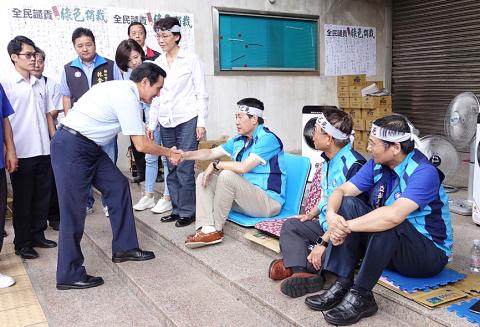Former president Ma Ying-jeou (馬英九) yesterday accused President Tsai Ing-wen (蔡英文) of leading a “fascist” regime as he visited Chinese Nationalist Party (KMT) lawmakers participating in a hunger strike to show his support.
KMT legislators Lai Shyh-bao (賴士葆), Alex Fai (費鴻泰) and William Tseng (曾銘宗) have been fasting since Tuesday night to protest the administration’s Forward-looking Infrastructure Development Program.
The legislature passed the plan’s first-phase budget, slated to be spent in the next four years, at 1am yesterday.

Photo: Liu Hsin-de, Taipei Times
Ma said that Lai, Fai and Tseng launched a 50-hour hunger strike to protest the unconstitutional methods the Democratic Progressive Party (DPP) used to pass the budget bill.
“After the DPP gained control of both the executive and legislative branches of government, it has completely transformed into a fascist regime. As the party in power, it has been persecuting the opposition and making the public foot its bills,” Ma said.
The former president joined the lawmakers for 30 minutes outside the Legislative Yuan building in a sit-down protest before leaving.
He was booed by passersby who chanted: “Down with Ma Ying-jeou.”
Meanwhile, the KMT caucus vowed to launch a coordinated strategy with their colleagues in city and county councils to supervise the plan’s implementation.
“The Legislative Yuan is a national representative body of the Republic of China, not the Executive Yuan’s lawmaking bureau. The DPP has destroyed procedural justice to execute Tsai’s will,” KMT deputy secretary-general Lee Yen-hsiu (李彥秀) told a news conference.
“Passing the plan is the DPP’s birthday present to Tsai, which was bought at the expense of the nation’s future because it was done without regard to the nation’s fiscal situation,” Lee said.
KMT Legislator and former legislative speaker Wang Jin-pyng (王金平) read a statement with other KMT lawmakers at his side.
“It is essential for a democracy to practice the separation of powers and democratic principles. The Legislative Yuan is the Republic of China’s national assembly, not the Executive Yuan’s lawmaking bureau,” he read.
There were only three times in the Legislative Yuan’s history that a budget was reviewed by a committee without the premier making a report to the general assembly, Wang said.
In each case, the budget was arrived at through negotiations between the government and the opposition, Wang said.
“Those precedents are completely unlike the illegal procedures used to pass the Forward-looking Infrastructure Development Program,” he said.
The DPP wanted to lower the minimum number of lawmakers needed to forward a motion to three, Wang added.
DPP caucus convener Ker Chien-ming (柯建銘) led the effort to amend the legislature’s procedural rules, saying at the time that it was an important safeguard for the rights of minority parties, Wang said.
Legislative Speaker Su Jia-chyuan (蘇嘉全), a DPP member, did not use the procedural rules correctly when he dismissed the KMT’s filed motions, as the rules of procedure do not take precedence over written laws, he added.
Wang refused to comment when a reporter asked him to respond directly on the legality of the infrastructure plan’s budget authorization.

Taiwan is stepping up plans to create self-sufficient supply chains for combat drones and increase foreign orders from the US to counter China’s numerical superiority, a defense official said on Saturday. Commenting on condition of anonymity, the official said the nation’s armed forces are in agreement with US Admiral Samuel Paparo’s assessment that Taiwan’s military must be prepared to turn the nation’s waters into a “hellscape” for the Chinese People’s Liberation Army (PLA). Paparo, the commander of the US Indo-Pacific Command, reiterated the concept during a Congressional hearing in Washington on Wednesday. He first coined the term in a security conference last

Prosecutors today declined to say who was questioned regarding alleged forgery on petitions to recall Democratic Progressive Party (DPP) legislators, after Chinese-language media earlier reported that members of the Chinese Nationalist Party (KMT) Youth League were brought in for questioning. The Ministry of Justice Investigation Bureau confirmed that two people had been questioned, but did not disclose any further information about the ongoing investigation. KMT Youth League members Lee Hsiao-liang (李孝亮) and Liu Szu-yin (劉思吟) — who are leading the effort to recall DPP caucus chief executive Rosalia Wu (吳思瑤) and Legislator Wu Pei-yi (吳沛憶) — both posted on Facebook saying: “I

A court has approved Kaohsiung prosecutors’ request that two people working for Democratic Progressive Party (DPP) Legislator Lin Dai-hua (林岱樺) be detained, as a probe into two cases allegedly involving her continues. The request was made on Friday, after prosecutors raided Lin’s two offices and the staffers’ residences, and questioned five on suspicion of contravening the Anti-Corruption Act (貪汙治罪條例). The people included the directors of Lin’s Daliao (大寮) and Linyuan (林園) district offices in Kaohsiung, surnamed Chou (周) and Lin (林) respectively, as well as three other staffers. The prosecutors’ move came after they interrogated Lin Dai-hua on Wednesday. She appeared solemn following

Sung Chien-liang (宋建樑), who led efforts to recall Democratic Progressive Party (DPP) Legislator Lee Kun-cheng (李坤城), was released on bail of NT$80,000 today amid outcry over his decision to wear a Nazi armband to questioning the night before. Sung arrived at the New Taipei District Prosecutors’ Office for questioning in a recall petition forgery case last night wearing a red armband bearing a swastika, carrying a copy of Adolf Hitler’s Mein Kampf and giving a Nazi salute. Sung left the building at 1:15am without the armband and covering the book with his coat. Lee said today that this is a serious